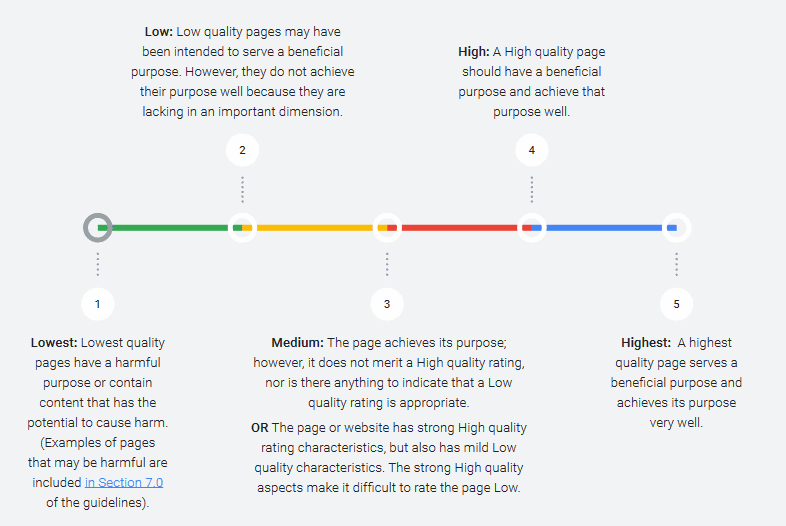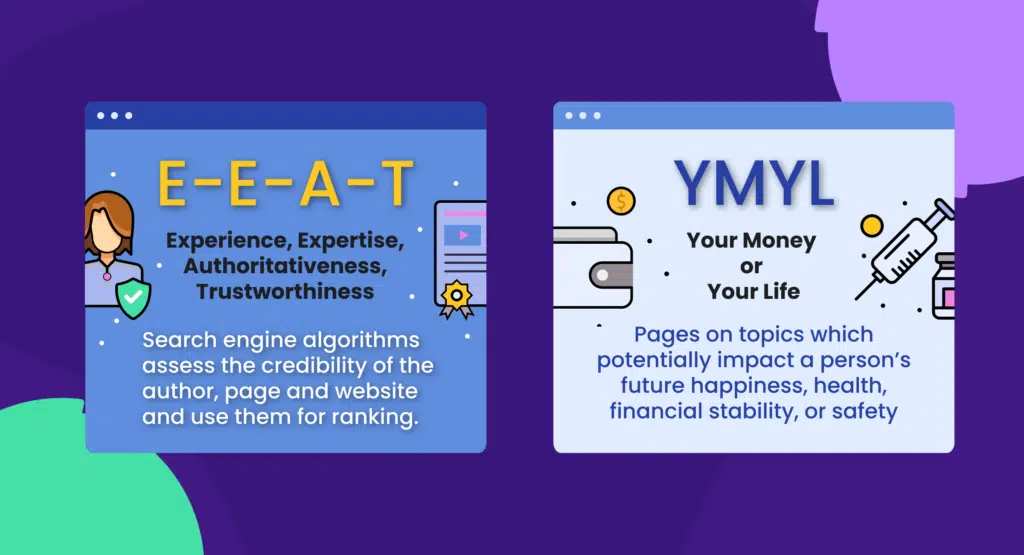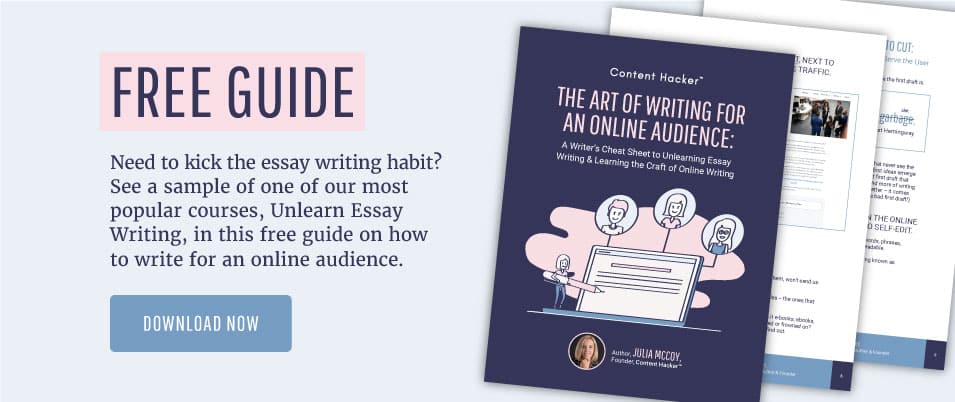Uncover the secrets behind Google’s Quality Content Guidelines for EAT and YMYL and discover what it means for your site.

Image courtesy of via DALL-E 3
Table of Contents
Have you ever searched for something important online, like how to stay healthy or how to manage your money wisely? It’s crucial to find trustworthy and reliable information when it really matters. That’s where EAT and YMYL come in. These are not food-related terms, but they’re essential for making sure you get the best information when you need it most.
Why We Need Good Information
Whether you’re looking up a recipe, studying for a test, or learning about a serious medical condition, having accurate and useful information is vital. Good information can help you make smart decisions, stay safe, and even improve your quality of life.
Google’s Role
Google is like a super-smart librarian for the internet. It helps people like you and me find the most helpful and reliable information out there. By using special rules and guidelines, Google can figure out which websites have the best content for your search.
What is EAT?
When it comes to finding reliable information online, there are key factors to consider. One of these important factors is EAT, which stands for Expertise, Authoritativeness, and Trustworthiness. Let’s break down what each of these means and why they are crucial for ensuring the quality of online content.
Expertise
Expertise refers to being knowledgeable and skillful in a particular subject. When content is created by someone who is an expert in the field, it is more likely to be accurate and reliable. Think of it like getting advice about basketball from a professional basketball player – you know you’re getting information from someone who truly understands the game.
Authoritativeness
Being authoritative means being seen as a trusted source of information. When someone is recognized as an authority in a certain area, people are more inclined to believe what they say. This helps ensure that the information presented is credible and worthy of trust.
Trustworthiness
Trustworthiness is all about being honest, transparent, and dependable. When content is trustworthy, it means that it has been created with the intention of providing accurate and helpful information. Trustworthy content helps users feel safe and secure when relying on it for guidance.
What is YMYL?
YMYL, which stands for Your Money or Your Life, covers important topics that can deeply impact a person’s health, finances, or happiness. When you search for information about these crucial areas, you want to make sure you find accurate and trustworthy answers.
Money
Financial information is a big part of YMYL. Imagine looking for advice on how to save money or invest wisely. Getting the right information can help you make good choices that can affect your future finances. That’s why it’s so important to rely on trustworthy sources when it comes to money matters.
Health
Health topics, like how to stay healthy or what to do if you’re feeling sick, fall under YMYL. When it comes to health, having the right information can make a big difference in how you take care of yourself or others. That’s why it’s crucial to find reliable sources for health-related questions.
Happiness and Safety
YMYL is not just about money and health. It also includes topics that relate to your overall happiness and safety. For example, finding tips on managing stress or staying safe online are important aspects of YMYL. These topics can have a significant impact on your daily life, so it’s vital to look for trustworthy information in these areas as well.
How Google Evaluates EAT and YMYL
Google plays a crucial role in helping people find trustworthy and reliable information on the internet, especially when it comes to topics that really matter. In order to ensure the quality of content displayed in search results, Google evaluates two key concepts: EAT (Expertise, Authoritativeness, Trustworthiness) and YMYL (Your Money or Your Life).

Image courtesy of via Google Images
Search Quality Guidelines
Google has established search quality guidelines that provide a framework for assessing the EAT and YMYL of web content. These guidelines help Google’s evaluators understand what makes high-quality content and how to distinguish it from low-quality or misleading information.
Algorithms
Google uses sophisticated algorithms to analyze web pages and determine their EAT and YMYL status. These algorithms take into account various factors such as the expertise of the author, the authority of the website, and the overall trustworthiness of the content. By utilizing these algorithms, Google aims to deliver the most relevant and reliable information to users.
Why EAT and YMYL Matter
Understanding why EAT (Expertise, Authoritativeness, Trustworthiness) and YMYL (Your Money or Your Life) are crucial can help us navigate the vast sea of information on the internet. Let’s dive into why these guidelines truly matter.
For Users
For everyday internet users like you and me, EAT and YMYL are like a shield that protects us from misinformation and unreliable content. When we search for important topics like health, finances, or safety, we want to find accurate and trustworthy information quickly. Following EAT and YMYL guidelines ensures that the content we encounter is reliable and safe to rely on, making our online experience more secure and informative.
For Websites
For websites and content creators, adhering to EAT and YMYL guidelines is not just a suggestion; it’s a necessity. By following these guidelines, websites can build a strong foundation of trust with their audience. When users know that a website values expertise, authority, trustworthiness, and covers high-stakes topics responsibly, they are more likely to return and engage with the content. Upholding these standards also helps websites maintain their credibility and reputation in the vast digital landscape, ultimately leading to a loyal and satisfied audience.
Creating Content with High EAT
Creating content with high Expertise, Authoritativeness, and Trustworthiness (EAT) is essential for writers and website owners who aim to provide quality information online. By following these tips and best practices, you can ensure that your content stands out as reliable and valuable.

Image courtesy of via Google Images
Becoming an Expert
To create content with high EAT, it is crucial to become an expert in your chosen topic. This involves researching extensively, staying up to date with the latest developments, and gaining a deep understanding of the subject matter. By investing time and effort in becoming proficient in your field, you can establish yourself as a credible source of information.
Building Authority
Building authority in your content involves showcasing your expertise and knowledge in a compelling way. This can be achieved through citing reputable sources, providing data and statistics to support your claims, and demonstrating a thorough understanding of the topic. By consistently delivering valuable and accurate information, you can enhance your authority and credibility as a content creator.
Establishing Trust
Trustworthiness plays a significant role in creating content with high EAT. To establish trust with your audience, it is essential to be transparent, honest, and ethically sound in your content creation. Use clear language, provide accurate information, and cite reliable sources to build trust with your readers. By prioritizing integrity and credibility in your content, you can ensure that your audience feels secure and informed.
Avoiding Common Pitfalls
One common mistake in creating web content is spreading false information. When inaccurate details are shared online, it can mislead people and harm their understanding. Always double-check facts before publishing to ensure you are providing accurate and reliable information to your audience.
Poor Sources
Using unreliable sources can seriously affect the credibility of your content. Ensure that the sources you cite are trustworthy and reputable. Neglecting to verify the credibility of your sources can undermine the Expertise, Authoritativeness, and Trustworthiness (EAT) of your content.
Clickbait
Clickbait refers to enticing headlines or thumbnails that lure users to click on a link, but the actual content does not deliver what was promised. This practice is harmful as it can erode trust with your audience. Be transparent and honest in your content to maintain the trust of your readers.
Fun Ways to Test Your Content
Creating good content that follows EAT and YMYL guidelines is essential for providing trustworthy information online. But how can you make sure your content meets these standards? Here are a few fun ways to test your content and ensure it is reliable and valuable.

Image courtesy of via Google Images
Peer Review Games
One way to test your content is by playing a game with your friends or family. Ask them to read through your content and give you feedback. You can turn this into a fun activity by creating a scoring system or turning it into a competition to see who can find the most helpful suggestions for improvement. This way, you can get multiple perspectives on your content and make sure it meets the EAT and YMYL criteria.
Trustworthiness Quiz
Another fun way to test your content is by creating a trustworthiness quiz. You can come up with a list of questions that assess how trustworthy your content appears to be. For example, you can ask questions like “Does the content cite reliable sources?” or “Is the information presented in a clear and honest way?” By taking this quiz yourself or having others take it, you can identify areas where your content may need improvement to meet the EAT and YMYL standards.
Summary
In this blog post, we discussed the importance of EAT and YMYL guidelines in ensuring the quality of online content. EAT, which stands for Expertise, Authoritativeness, and Trustworthiness, emphasizes the need for content creators to be knowledgeable, trustworthy, and authoritative in their respective fields. On the other hand, YMYL content covers topics related to one’s health, finances, and overall well-being.
We also delved into how Google evaluates EAT and YMYL to determine the quality of web content. Google’s search quality guidelines and algorithms play a crucial role in this evaluation process, helping users access reliable and accurate information quickly and efficiently.
Understanding the significance of EAT and YMYL is vital for both users and website owners. These guidelines not only aid users in finding trustworthy information but also help websites maintain user trust and credibility. By creating content with high EAT, writers and website owners can ensure that their content meets the necessary standards for quality and reliability.
Lastly, we highlighted common pitfalls to avoid when creating web content, such as spreading misinformation, using poor sources, and resorting to clickbait tactics. By steering clear of these pitfalls and engaging in fun ways to test content, content creators can uphold the integrity of their work and provide users with valuable and trustworthy information.
Want to turn these SEO insights into real results? Seorocket is an all-in-one AI SEO solution that uses the power of AI to analyze your competition and craft high-ranking content.
Seorocket offers a suite of powerful tools, including a Keyword Researcher to find the most profitable keywords, an AI Writer to generate unique and Google-friendly content, and an Automatic Publisher to schedule and publish your content directly to your website. Plus, you’ll get real-time performance tracking so you can see exactly what’s working and make adjustments as needed.
Stop just reading about SEO – take action with Seorocket and skyrocket your search rankings today. Sign up for a free trial and see the difference Seorocket can make for your website!
Frequently Asked Questions (FAQs)
What Does EAT Stand For?
EAT stands for Expertise, Authoritativeness, and Trustworthiness. Expertise means being knowledgeable in a particular subject. Authoritativeness refers to being a respected source in that field. Trustworthiness embodies being reliable and truthful in the information you provide.
Why is YMYL Important?
YMYL, which stands for Your Money or Your Life, is crucial because it covers topics that can directly impact a person’s health, finances, or overall well-being. Ensuring that information related to these areas is accurate and trustworthy is essential to safeguarding users from potential harm.
How Can I Improve My Website’s EAT?
To enhance your website’s EAT, you can start by focusing on creating high-quality content that demonstrates your expertise, authority, and trustworthiness. Additionally, citing reliable sources, engaging with your audience, and staying transparent about your content and intentions can further boost your website’s EAT score.







